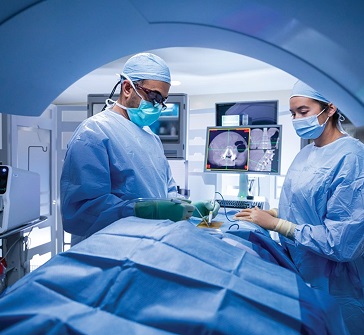 Book Appt.
Book Appt.
 Call Now
Call Now


Introduction
A craniotomy is a type of brain surgery in which a neurosurgeon opens and removes a section of the skull to provide access to the brain. During the same procedure, your surgeon will reattach the piece of your skull. A craniotomy is a serious operation. A surgeon typically considers this sort of treatment after identifying a brain tumor, a life-threatening disease, or a traumatic brain injury.
Difference between a craniotomy and a craniectomy
A craniotomy and a craniectomy are both types of brain surgery; however, they are not the same technique. A craniotomy is a surgical technique that includes removing and replacing a portion of your skull in order to access your brain. During a craniectomy, a surgeon will remove a portion of your skull, but it will not be promptly returned to its original place. To repair the missing area of your skull, you may require a follow-up operation known as cranioplasty.
Types of craniotomy
There are various craniotomy procedures. Their names refer to the place from which your surgeon will remove a piece of your skull to gain access to the brain. Craniotomy procedures are classified as frontal, temporal, parietal, pterional (frontotemporal), orbitozygomatic, retrosigmoid (keyhole), and suboccipital.
What is a craniotomy for?
A craniotomy may be required to treat a tumor, blood clot, aberrant collection of blood vessels (vascular malformations), tangled blood vessels (arteriovenous malformation), artery enlargement (aneurysm), swelling or pressure in the brain, epilepsy, or skull fracture.
Diagnosis
Before craniotomy surgery, you’ll meet with your surgeon, who’ll carefully plan the procedure. They’ll order several tests to assess your health and the reason for your surgery. Tests also help your anesthesiologist determine how much anesthetic to give during your procedure. You may need the following tests before a craniotomy, such as physical examination, blood tests, and imaging tests (MRI, CT scan, PET scan, or angiography).
Procedure
Preparation
Arriving for your surgery on an empty stomach.
Stop taking any blood thinners three to ten days before your surgery.
Corticosteroids, antibiotics, and anticonvulsant medications should be administered before surgery.
During procedure
On the day of your craniotomy surgery, an anesthesiologist will administer anaesthesia. This will make you feel no discomfort. In the operating room, your surgical team will position your head and body to prevent putting pressure on any locations.
Your surgeon will first shave any hair near the incision site and sterilize your head (using iodine or alcohol to kill germs and limit the risk of infection). Then they'll cut or open your skin. The position of the opening changes depending on the type of craniotomy required. Your surgeon will adjust or reposition the muscles surrounding your skull. Next, your surgeon will drill multiple holes and use a medical saw to remove a piece of your skull.
After removing a section of your skull, your surgical team will place it on a surgical instrument table so that it can be used to close your skull at the end of the procedure. Depending on the cause of the operation, your surgeon will either remove or heal your brain. After your brain problem is fixed, your surgeon will reconstruct your skull as if it were a puzzle. Following that, your surgeon will close the skin incision and correct any muscles or tissues.
After procedure
Following a craniotomy, you will be admitted to a hospital's critical care unit (ICU). Your care team will monitor your recovery until you can leave the ICU. You will need to stay in the hospital for up to a week following your procedure.
Benefits
The benefits of a craniotomy differ depending on the purpose of the surgery. The primary advantage is that it addresses the cause of the surgery, which could include:
A tumor has been removed.
Taking care of an underlying disorder.
Repairing blood vessels, bones, and brain components.
Risks
A craniotomy may result in bleeding, pain, haemorrhage, seizures, stroke, coma, hydrocephalus, infection, and headaches. Some craniotomies might be life-threatening. Your surgeon will explain these risks and collaborate with your care team to avoid complications from occurring during and after your surgery.
Conclusion
A craniotomy is a critical and sophisticated surgical surgery used to treat a variety of brain disorders, including tumors, aneurysms, and traumatic injuries. While it has inherent hazards such as infection, neurological impairments, and seizures, advances in neurosurgical procedures and technologies have greatly improved safety and outcomes. Several factors contribute to successful recovery, including the ailment being treated, surgical precision, and post-operative care. Rehabilitation, which includes physical, occupational, and speech therapy, is critical in restoring functionality, particularly when sensitive brain areas are implicated.
SHALBY Sanar International Hospitals provides extensive medical procedures backed up with our state-of-the-art technology and a team of highly qualified & experienced clinical experts.

Patient from Iraq gets treated by Dr. Harnarayan Singh | SHALBY Sanar International Hospitals

15 year old Patient from Liberia gets treated by Dr Harnarayan Singh | Neurosurgery & Spine Surgery

Mrs. Khalida Khaleel from Iraq Overcomes Degenerative Disc & Grade 1 Spondylolisthesis

Successful Treatment of a Patient from Uzbekistan for Degenerative Disc Disease and Back Syndrome

Surviving Stroke: Bipasha Banerjee's Testimony on Timely Intervention

Successful Intraoperation Neuro Monitoring on patient Hasan from Iraq

Successful removal of Glioma using advanced machines

A multidisciplinary care worked wonders for Ms. Akhtamova from Tajikistan

Treatment for Brain Aneurysm - Al Qumairi Saeed Mohsen Awadh from Yemen
Our doctors pen down their research findings and experiences from time to time. Their words provide deep insight into the latest techniques, technologies and other advancements in healthcare. It provides expert answers to all kinds of health questions for real-life issues.
VIEW ALL




Since the day of its foundation, SHALBY Sanar International Hospitals is committed to provide comprehensive healthcare services. It regularly organizes awareness programs in its premises and encourages outdoor healthcare activities and camps with an intent to put focus on preventive healthcare.
VIEW ALL